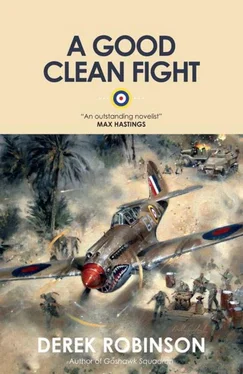“Yes, I did.” Malplacket returned the pages. “Very wise.”
Lester stuffed them into his back pocket.
“The new satirical undertones are far more telling,” Malplacket said.
“Horseshit.”
Malplacket recoiled slightly. “My dear fellow. You do yourself an injustice.”
“Where? Show me where.”
“It runs throughout. The merest undertones. Your satire is never rampant. One of the qualities I most admire in your work is its satirical restraint.”
“Sure. And this heat’s fried your brains.”
An hour before sundown Malplacket cooked another meal. “I’m afraid it’s stew again,” he said. “However, I put in some prunes for variety.”
Lester was standing on the roof of the Fiat, searching the northern horizon. “Forty-eight hours,” he said. “They should be here by now.” He climbed down. “I’ve been thinking. We never would have got into Benghazi without your nosebleed. That was a truly gutsy nosebleed.”
“Thank you. And your performance at the Italian lady’s villa was outstanding.”
“Yeah, I thought so. I’ve always wanted to beat on a door with the butt of a pistol.”
“Gratifying?”
“I found it so.” Lester walked around the car, kicking the tires. “Listen: I know how you feel about alarm and despondency and so on, but… Let’s not kid ourselves. This is beginning to look not so good, isn’t it?”
“A fair summary.”
The night was cold again. The dawn was brilliant, but it revealed an empty desert.
“If we don’t go back to the Jebel now,” Malplacket said, “by tomorrow we shall be out of water.” But the Fiat would not start. The more they tried, the more they ran down the battery. Winding the starting handle made noise and blisters, but the engine remained dead. They cleaned every part that was cleanable, and achieved nothing. The sun was brutal. They got into the car to escape it.
“Just tell me one thing,” Lester said. “Honest answer, OK? Did I really put any irony in that first draft?”
“None.”
“How about the second?”
“I invented the satirical undertones.”
“Now tell me why—”
“A joke,” Malplacket said. “All a joke.”
Lester hunched his shoulders and stared at the trembling horizon.
“Hell of a time to make jokes,” he said.
“It was irresistible, I’m afraid.”
“I leave irony to Hemingway. I put irony in a story, it gets spiked.”
“I apologize. In any case I’m afraid that the joke may have been on me. The real irony is all around us, isn’t it? The desert gave us our adventure and now, thanks to the desert, we can’t report it.”
Lester got out and tried the starting handle again. It felt like winding up a diesel locomotive. He soon quit.
“I was going to do a third draft,” he said. “You know, add some more color.”
“I wouldn’t bother, old chap. What you’ve done is fine.”
Lester picked at his blisters. “Anyway, the story’s not over yet, is it?”
“Good point. Who knows what the morrow may bring?”
When the moon rose, they began walking north. Lester carried a jerrican with about three pints of water in it. Malplacket had calculated that it was roughly a hundred kilometers to the edge of the Jebel, to food and water, provided they kept a straight course. The trouble with walking at night was they couldn’t use the sun compass.
“Plenty of stars up there,” Lester said. “I don’t suppose you know how to steer by the stars?”
“Oddly enough, they failed to teach me that at Eton,” Malplacket said. “Very remiss of them, wouldn’t you say?” The three pints of water sloshed back and forth with every pace.
* * *
It took a long time, but details of the strafing of Lampard’s trucks trickled through to SAS headquarters, via the International Red Cross, and Captain Kerr was able to write to the next-of-kin. Colonel von Mansdorf and Oberstleutnant Benno Hoffmann got their information much sooner, of course. A German Desert Rescue column had reached the scene while the wreckage was still smoking and brought all the bodies back to Benghazi. Benno Hoffmann escorted Dr. Grandinetti to Schramm’s funeral. He was distressed when she cried during the service, but it was only a little, and he cheered up when she smiled at him.
“Poor Paul,” she said. “Poor me. Poor us.”
Afterward, he took her for a drink at the Officers’ Club. “The first time we went out for dinner, this was where he wanted us to go,” she said. “For a romantic, Paul had very little imagination.”
“I never thought of him as a romantic,” Hoffmann said. “Of course he wanted to marry you, so…” He relaxed: the funeral had taken more out of him than he had expected. “Was that ever going to be possible?” he asked.
“He thought so. He thought he had earned it. Paul believed that pain was payment. He’d suffered, so now he deserved to be happy.”
“Well, you made him happy,” Hoffmann said. “Or at least you made him less unhappy.”
“Did I? I helped him to stop feeling sorry for himself and to stop being angry with everyone else. And I showed him a lot of dying men, so he could see that war is not adventure and that pain is not payment, because it buys nothing. He didn’t believe me,” she added.
“He really shouldn’t have gone on that raid,” Hoffmann said. “It was bound to be dangerous.”
“Oh well. Isn’t that why he went? Men are always killing themselves to prove their manhood.”
“What Max would call a self-inflicted wound,” Hoffmann said sadly.
“At least Paul made a thorough job of it,” she said. “At least he didn’t come back and expect me to help him finish it for him. He was kind enough to spare me that.”
Her words sounded strangely flat. Hoffmann looked, and saw that her eyes were drenched with tears. He felt clumsy and inadequate; he searched for a helpful answer and found none, so in the end he said what he thought. “You loved him, didn’t you?” he said.
“He was such a middle-aged child. I shall always miss him.”
She finished her drink. They parted and went back to work. Two days later she left Benghazi for Milan.
There were no more raids on the Takoradi Trail. Fanny Barton got made up to wing commander, but he did not get a DSO; he went to Rhodesia and took over a Flying Training School. Hick Hooper returned to the US Army Air Force and enjoyed his war. Pip Patterson survived. Skull got posted to a bomber squadron in Egypt; after all, he knew something about bombers.
Hornet Squadron was re-formed with a fresh batch of pilots. Kellaway had recovered his wits so he stayed on as adjutant. “Chaps come and go,” he told the new Intelligence Officer, “but the squadron never dies.”
That was in May 1942. One month later, Rommel’s advance had carried him so deep into Egypt that he was within a day’s drive of Cairo when he was finally checked at El Alamein. By November 1942 the German army had been soundly defeated there. It began a retreat that was to cover more than a thousand miles, through Egypt and Libya, to Tunisia. In May 1943 the last German soldiers in North Africa surrendered. On September 4, 1943, Italy was invaded and Allied armies were on the mainland of Europe. The Desert Air Force and the SAS went with them. They fought until the war was won, on May 7, 1945.
THE END
A Good Clean Fight is fiction built around fact. I reckon the reader is entitled to know which is which. In brief: the characters are invented, while the history and the geography are as accurate as I could make them.
The Luftwaffe did have airfields around the Jebel (at Barce, for instance) that were attacked by the SAS; and SAS patrols did drive hundreds of miles via Kufra Oasis in order to raid behind enemy lines. Kufra was not the only desert base that the SAS used, and I have juggled the dates slightly so as to make Kufra their main staging-post in the spring of 1942, a time when there was a lull in the ground war and the Gazala Line separated the two sides.
Читать дальше












